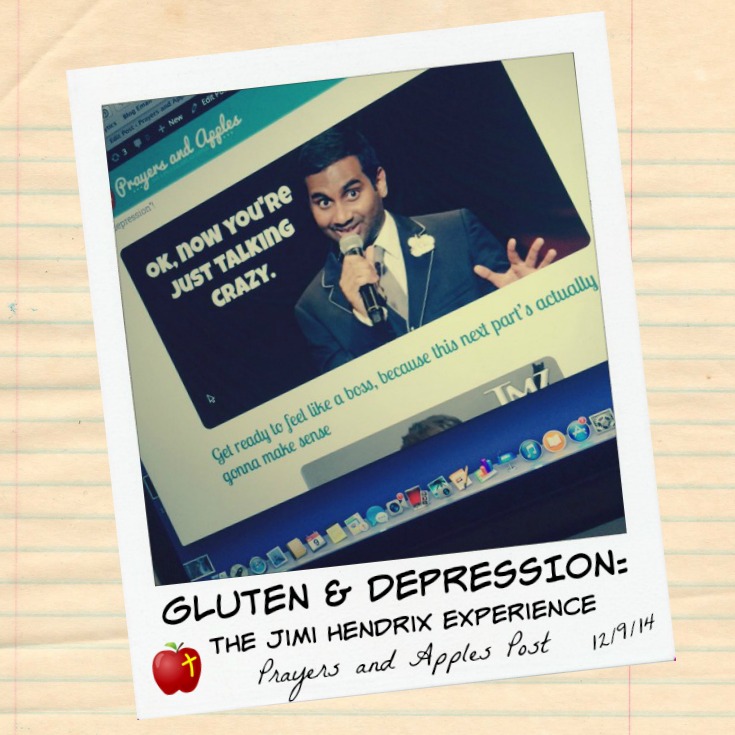Did anyone else wrap up that Justin Timberlake post and think: “That was awesome!! But how does all this new research – implicating the gut microbiome in the development of neural systems influencing the body’s response to stress – fit in with the current theory that the main link between celiac disease and depression is a compromised ability to absorb nutrients?”
*Sigh* …It’s like we just get each other!!
(Totally unrelated side note)
I know, I usually save these til the end. But I thought it might be important to disclose that I’m writing this entire post listening to Led Zeppelin and Jimi Hendrix – so in case things get like really awesome, that’s where that’s coming from.
#heyjoe
Back to our regularly scheduled programming
Ok, so Justin Timberlake and Keanu Reeves gifted us with the gut microbiome basics:
- There’s a bunch of bacteria (nearly 1oo trillion!) living in our bodies,
- A little community of bacteria is called a microbiota or microbiome,
- Our gut microbiome has the ability to influence behavior in the brain that controls our body’s response to stress,
- And our gut microbiome is influenced by a number of factors, including: diet, metabolism, age and stress (I know, it’s like this big never ending cycle!)
 Which leaves us with some pretty interesting questions about the link between obesity and mental health – like:
Which leaves us with some pretty interesting questions about the link between obesity and mental health – like:
- Is the standard American diet (i.e., unhealthy food) influencing our gut microbiome in a negative way, leading us to feel anxious and depressed?
- If we ate differently, would the rate of anxiety disorders/depression decrease?
- What do our lil gut microbiome friends like to eat anyway?
To quote myself…
(Quick re-cap for those of you who missed the Timberlake post!)
Gastrointestinal (GI) distress has long been linked to psychological disturbance. For example, a 1998 study of 92 celiac disease patients found that approximately one-third suffer from depression. (This particular connection – between celiac disease and depression – is currently attributed to a damaged/reduced intestinal surface which prevents patients from absorbing critical nutrients needed to manufacture neurotransmitters like serotonin.)
However, studies (1, 2) have shown that in experiments resulting in increased GI inflammation, there are notable increases in anxiety-like behavior – and treatment with a probiotic (i.e., good bacteria) calms things down.
So it kinda makes you wonder:
What do we know for sure about the link between celiac disease and depression?
In other words: if treatment with a probiotic helps, does that mean that the link between celiac disease and depression isn’t due to a decreased ability to absorb critical nutrients/manufacture neurotransmitters? Or does the old theory stand and it just means that activity in our gut microbiome factors into the equation?
(Just a warning for anyone getting ready to skip to the end: There’s no big answers in today’s post – more like a bunch of studies leading to more clues and a guess.)
Get it?! Clue! Hahaha :)
(Ok, sorry, back to business…)
So, it looks like a 1982 study by Hallert, Astrom & Sedvall got the ball rolling on the idea that celiac disease and depression may be linked by a reduction in brain monoamine metabolism (meaning your brain’s not getting all of the stuff it needs to take care of neurotransmitter business) and a 1996 Hepatogastroenterology study pushed the idea forward that the two are linked by malabsorption-related malnutrition.
(If anyone wants to dork out with me real quick: That 1982 study showed low concentrations of three major monoamine metabolites in celiac patients and those levels, including 5-Hydroxyindoleacetic acid (5-HIAA), were inversely related to depression symptoms (i.e., low levels of 5-HIAA = high levels of depression). Well, 5-HIAA is the main metabolite of serotonin. Flashback to that post where we looked at anorexia nervousa and depression. Remember those studies (1,2) that suggested that since tryptophan is the precursor to serotonin – and it’s only available through diet – that diet restriction and malnutrition may decrease serotonin stores because tryptophan is less available, leading to symptoms of anxiety and depression? Well, decreased levels of tryptophan have also been observed in celiac patients! Boom! #fullcircle)
Not so fast
Here’s the thing: All of this “celiac disease may be linked to depression through a decreased ability to absorb nutrients” talk seems to be pointing towards the idea that depression is caused by a serotonin deficiency. And while it seems like serotonin is mixed up in depression somehow, we’ve got some pretty big names reminding us that “no abnormality of serotonin in depression has ever been demonstrated” (psychopharmacologist, David Healy’s words, not mine).
I mean, science journalist, John Horgan, even went so far as to write:
“Given the ubiquity of a neurotransmitter such as serotonin and the multiplicity of its functions, it is almost as meaningless to implicate it in depression as it is to implicate blood.”
So you see what I’m saying?
Most of the studies so far have linked celiac disease and depression through a series of events (triggered by a reduced ability to absorb nutrients) that leads to your brain not pumping out serotonin the way it normally does. But we’ve never ever established that a lack of serotonin causes depression. And now we’re seeing new studies (1, 2) that show anxiety symptoms in celiac patients decrease with probiotic use (Bifidobacterium longum NCC3001 for all my bacteria ballers) – which researchers think has something to do with B. longum decreasing the excitability of enteric neurons and signaling the central nervous system.
Not a clue, Biebs. Not a clue.
But let’s keep digging:
A 2001 study published by the Scandinavian Journal of Gastroenterology (stop me if you’ve heard this one already) looked at 35 celiac diseases patients before and after one year of following a gluten-free diet (GFD). The celiac group was compared to a control group of healthy subjects matched for gender, age and socio-economic status.
Prior to the GFD, the celiac group showed much higher levels of state anxiety than the controls (71.4% versus 23.7%) and significantly higher levels of depression (57.1% versus 9.6%). (Let’s just stop and let that sink in for a second – because those are some pretty impressive statistics!)
After one year of following a GFD, the percentage of state anxiety in the celiac group dropped 45.7% – plummeting from 71.4% to 25.7%!
(Interestingly enough, there were no significant changes in the percentage of depression – which the researchers suggest could be related to a reduction of quality in life for patients forced to follow a GFD).
So there’s definitely a link between celiac disease and psychological disturbance.
(…Not completely sure why or how, but let’s just put that on the shelf for a second…)
But what about gluten’s effect on people without celiac disease?
Funny you should ask! Because this past May, Alimentary Pharmacology and Therapeutics published a really cool study finding that among 22 subjects with irritable bowel syndrome who did not have celiac disease, “short-term exposure to gluten specifically induced current feelings of depression”!
Get ready to feel like a boss, because this next part’s actually gonna make sense
(By the way, not completely sure how we went from Jimi Hendrix to Justin Bieber…? But if you watched that deposition, you know it’s best not to question the Biebs.)
#humor
Ok, so after researchers saw that gluten induced feelings of depression in subjects without celiac disease, they started tossing around ideas about why. And one of their first guesses? The ole “not getting enough tryptophan leading to not enough serotonin” theory. (How cool is it that we could actually see that coming?!)
However, given our complicated relationship with serotonin and depression (I don’t think any of us know how to feel about the dynamic between those two anymore…), I’m betting you guys are going to be a lot more interested in Theory B – which involves… *Drumroll Please!*… THE GUT MICROBIOME!!!
That’s right, Jimi, our microbiome friends are back! And this time, researchers think that gluten-mediated changes in the gut microbiome might have something to do with depression symptoms that appear and disappear with the presence of gluten. (Keep in mind, this is all still guesswork – but if I had to throw my vote behind one theory, I’m jumping on this one.)
Let’s review the facts, shall we?
- Several studies have reported microbial imbalance in patients with celiac disease, and
- Some of the alterations in the gut microbiome are restored after adherence to a gluten-free diet!
As our Alimentary Pharmacology and Therapeutics researchers explain, “this suggests that these changes are secondary consequences of the disease and perhaps directly related to the consumption of gluten.”
(And we already know that our gut microbiome can influence emotional behavior and underlying brain mechanisms…)
Hmmm, very interesting, Very interesting indeed.
One other idea
This last theory involves gluten ‘ex-orphins’, which – not gonna lie – I didn’t even know existed until about 10 minutes ago.
Apparently, they’re opioid peptides derived from partially digested food proteins, including gluten, which can modulate intestinal function (or at least that’s what I read in Gastroenterology). According to 2001 research published by the Japanese Journal of Pharmacology (and thankfully paraphrased by the good folks over at Alimentary Pharmacology and Therapeutics), these little opioid peptides can also “cross the blood-brain barrier and interfere with pain-inhibitory systems, emotionality and memory processes by modulating other hormonal or neurotransmitter systems via the opioid receptors as well as endogenous opioid peptides in the central nervous system.”
So yeah. There’s that too.
And The Wind Cries Mary
Ok, so I think I’ve had about as much science as I can take for one day (besides, Pandora keeps looping the same five songs over and over, so if I don’t stop typing soon I might just lose my red house voodoo child mind.)
But the point of today’s post?
- Gastrointestinal distress (like the type experienced with celiac disease) is related to psychological disturbance. #FACT
- Popular theory currently attributes that connection to a decreased ability to absorb nutrients that your body needs to make serotonin.
- However, we’ve never established that depression or anxiety is caused by a deficiency of serotonin.
- So I think something else is at play.
- And I think that something else involves our gut microbiome.
- And that’s really all I know.
But hey, if you wanna help me find some real answers, check out the video below and head on over to Indiegogo! ;)
#SmoothTransition
My campaign ends this Saturday, December 13 (and I’ve already registered for class and put my notice in at work)! The plan is to live out of the Harvard Square Hotel until I can come up with a better plan or get my own reality show starring as a crazy girl living out of a hotel?? – So if you want to join the Prayers and Apples Angels List, now would be the time! :) We’ve already gotten some great support from some of my heroes!
And how could we possibly finish a post about gut microbiome stuff without mentioning that THE Jessica Richman (yes, I really am that dorky that I put a “THE!!” in front of her name!) – CEO and co-founder of uBiome – started following Prayers and Apples on Twitter and re-tweeted our Justin Timberlake/Gut Microbiota post!
*Swoon* I’m tellin ya, kids – we’re getting big time over here ;) lol
Ok, off I go :)
Thank you so much for reading and for all of your support!
xo Jessica ♥
Resources
Addolorato, G., Stefanini, G., Capristo, E., Caputo, F., Gasbarrini, A. & Gasbarrini, G. (November-December 1996). Anxiety and depression in adult untreated celiac subjects and in patients affected by inflammatory bowel disease: a personality “trait” or a reactive illness? Hepatogastroenterology, 43(12), pp. 1513-17.
Addolorato, G., Capristo, E., Ghittoni, G., Valeri, C., Mascianà, R., Ancona, C. & Gasbarrini, G. (May 2001). Anxiety but not depression decreases in coeliac patients after one-year gluten-free diet: a longitudinal study. Scandinavian Journal of Gastroenterology, 36(5), pp. 502-6.
Bercik, P., Park, A.J., Sinclair, D., Khoshdel, A., Lu, J., Huang, X., Deng, Y., Blennerhassett, P.A., Fahnestock, M., Moine, D., Berger, B., Huizinga, J.D., Kunze, W., McLean, P.G., Bergonzelli, G.E., Collins, S.M., Verdu, E.F. (December 2011). The anxiolytic effect of Bifidobacterium longum NCC3001 involves vagal pathways for gut-brain communication. Neurogastroenterology and Motility: The Official Journal of the European Gastrointestinal Motility Society, 23(12), pp. 1132-9. DOI: 10.1111/j.1365-2982.2011.01796.x
Bercik, P., Verdu, E.F., Foster, J.A., Macri, J., Potter, M., Huang, X., Malinowski, P., Jackson, W., Blennerhassett, P., Neufeld, K.A., Lu, J., Khan, W.I., Corthesy-Theulaz, I., Cherbut, C., Bergonzelli, G.E. & Collins, S.M. (December 2010). Chronic gastrointestinal inflammation induces anxiety-like behavior and alters central nervous system biochemistry in mice. Gastroenterology, 139(6), pp. 2102-2112. DOI: 10.1053/j.gastro.2010.06.063
Ciacci, C., Iavarone, A., Mazzacca, G. & De Rosa, A. (March 1998). Depressive symptoms in adult celiac disease. Scandinavian Journal of Gastroenterology, 33(3), pp. 247-50.
Fera, T., Cascio, B., Angelini, G., Martini, S. & Guidetti, C.S. (2003 December). Affective disorders and quality of life in adult coeliac disease patients on a gluten-free diet. European Journal of Gastroenterology & Hepatology, 15(12), pp. 1287-92.
Gauthier, C., Hassler, C., Mattar, L., Launay, J.M., Callebert, J., Steiger, H., Melchior, J.C., Falissard, B., Berthoz, S., Mourier-Soleillant, V., Lang, F., Delorme, M., Pommereau, X., Gerardin, P., Bioulac, S., Bouvard, M., EVHAN Group & Godart, N. (January 2014). Symptoms of depression and anxiety in anorexia nervosa: links with plasma tryptophan and serotonin metabolism.Psychoneuroendocrinology, 39, pp. 170-8. doi: 10.1016/j.psyneuen.2013.09.009.
Gill, S.R., Pop, M., DeBoy, R.T., Eckburg, P.B., Turnbaugh, P.J., Samuel, B.S., Gordon, J.I., Relman, D.A., Fraser-Liggett, C.M. & Nelson, K.E. (June 2006). Metagenomic Analysis of the Human Distal Gut Microbiome. Science, 312(5778), pp. 1355-1359. DOI: 10.1126/science.1124234
Haleem, D.J. ( September 2012). Serotonin transmission in anorexia nervosa. Behavioral Pharmacology, 23(5-6), pp. 478-95. doi: 10.1097/FBP.0b013e328357440d
Hallert, C., Astrom, J. & Sedvall, G. (1982). Psychic disturbances in adult coeliac disease. III. Reduced central monoamine metabolism and sign of depression. Scandinavian Journal of Gastroenterology, 17, pp. 25–28.
Healy, D. (2004). Let Them Eat Prozac: The Unhealthy Relationship between the Pharmaceutical Companies and Depression. New York: New York University. Page 351.
Hernanz, A. & Polanco, I. (1991). Plasma precursor amino acids of central nervous system monoamines in children with coeliac disease. Gut, 32(12), pp. 1478–1481.
Horgan, J. (1999). The undiscovered mind: How the human brain defies replication, medication, and explanation. New York: Free Press. Page 336.
Lacasse, J.R. & Leo, J. (December 2005). Serotonin and Depression: A Disconnect between the Advertisements and the Scientific Literature. PLoS Medicine, 2 (12), p. e392.
Morley, J.E., Levine, A.S., Yamada, T., Gebhard, R.L., Prigge, W.F., Shafer, R.B., Goetz, F.C. & Silvis, S.E. (June 1983). Effect of exorphins on gastrointestinal function, hormonal release, and appetite. Gastroenterology, 84(6), pp. 1517-23.
Peters, S.L., Biesiekierski, J.R., Yelland, G.W., Muir, J.G. & Gibson, P.R. (May 2014). Randomised clinical trial: gluten may cause depression in subjects with non coeliac gluten sensitivity – an exploratory clinical study. Alimentary Pharmacology and Therapeutics, 39(10), pp. 1104-1112.
Sanz, Y., De Pama, G. & Laparra, M. (August 2011). Unraveling the ties between celiac disease and the intestinal microbiota. International Reviews of Immunology, 30(4), pp. 207-18. doi: 10.3109/08830185.2011.599084
Sudo, N., Chida, Y., Aiba, Y., Sonoda, J., Oyama, N., Yu, X.N., Kubo, C. & Koga, Y. (July 2004). Postnatal microbial colonization programs the hypothalamic-pituitary-adrenal system for stress response in mice. The Journal of Physiology, 558(Pt. 1), pp. 263-275.
Takahashi, M., Fukunaga, H., Kaneto, H., Fukudome, S. & Yoshikawa, M. (November 2000). Behavioral and pharmacological studies on gluten exorphin A5, a newly isolated bioactive food protein fragment, in mice. Japanese Journal of Pharmacology, 84(3), pp. 259-65.






















Leave a Reply